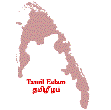The Ilankai Tamil Arasu Katchi (ITAK), the main constituent of the Tamil National Alliance — the lone credible representative of Tamil people in the Northern Province — has refused to revisit its constitution, which seeks the establishment of a separate state, at its 14th national convention in the Eastern headquarter town of Batticaloa.
The Sixth Amendment to the Sri Lankan Constitution, enacted in August 1983, prohibits political parties from having as one of their aims the establishment of a separate state. A petition was filed recently in the Supreme Court that sought the disqualification of the parties for retaining the demand for a separate state in their party documents.
“No. There was no move to amend the ITAK constitution,” TNA leader and MP M.A. Sumanthiran told The Hindu over phone. The ITAK has among its goals “establishing of a unitary Tamil State and a unitary Muslim State and achieving political, economical and cultural freedom of the Tamil speaking community”.
In short, TNA leader R. Sampanthan’s gesture in Jaffna on May 1 — that of waving the Sri Lankan national flag for the first time, alongside United National Party chief Ranil Wickramasinghe — did not translate into his party endorsing his sentiment. But it reaffirmed its faith in Mr. Sampanthan by electing him as its president, even as indecision is steadily leading Tamil politics in Sri Lanka to the brink of irrelevance. Maavai Senathirajah was elected party general secretary.
In resolutions passed at the Batticaloa meet, the ITAK demanded devolution of powers to the North and the East, taking it as a single unit. Asked if the ITAK had demanded re-merger of the Tamil majority Northern and Eastern Provinces, Mr. Sumanthiran said this was not the case. “North and East were considered a single unit,” he said, amplifying the diplomatic semantics, which the TNA loves dearly, at work.
The ITAK highlighted some of the crucial issues that dominate the discourse in both the North and the East: it demanded that Sri Lanka demilitarise both the provinces; that lands grabbed from Tamils be given back to them; and a general amnesty for Tamils imprisoned for many years without charges. The ITAK, and other constituents of the TNA, are the only political parties that have constantly probed issues relating to rehabilitation and resettlement of Tamils after the war and have often been on collision course with the government and local authorities. “If these demands are not granted, we will set a time and date and launch a non-violent campaign, much like what Mahatma Gandhi did,” said Mr. Sumanthiran.
Change of venue
The ITAK was forced to change its meeting venue at the last moment after the earlier venue was suddenly and inexplicably engulfed by fire. One source in Batticaloa claimed the place was fire-bombed. The meeting was being held in an area that is at the heart of a turf war between two former Tamil Tigers — the Eastern Province Chief Minister Sivanesathurai Santhirakanthan (better known as Pillaiyan, who was once a child soldier) and Deputy Minister Vinayagamoorthy Muralitharan (better known as Col. Karuna Amman, who was former Eastern Commander of the Tamil Tigers).
Pillaiyan’s party, the Tamil Makkal Viduthalai Puligal, was not in favour of ITAK holding the convention in Batticaloa. Posters had appeared in parts of Batticaloa against the convention.
The meeting did go ahead, and all elections were held as per the constitution of ITAK. Among the prominent names, E. Saravanabhavan, MP, who runs the Uthayan newspaper, was elected secretary (rehabilitation and resettlement) and Sivagnanam Sreetharan, MP, was elected secretary (propaganda). As expected, M.A. Sumanthiran MP, was elected secretary (legal and foreign affairs).
ITAK’s clarification
The ITAK constitution does not call for two seperate soverign countries for Tamils and Muslims, TNA leader M.A.Sumanthiran said, after reading The Hindu’s article in this website. The original is in Tamil (see PDF) and means autonomy or self-rule and not the creation of separate countries that the Sixth Amendment prohibits.
R. K. Radhakrishnan
The Hindu
